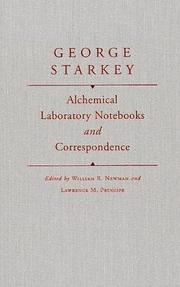| Listing 1 - 3 of 3 |
Sort by
|

ISBN: 0226577104 9780226577104 0226577015 9780226577012 Year: 2004 Publisher: Chicago University of Chicago Press
Abstract | Keywords | Export | Availability | Bookmark
 Loading...
Loading...Choose an application
- Reference Manager
- EndNote
- RefWorks (Direct export to RefWorks)
George Starkey-chymistry tutor to Robert Boyle, author of immensely popular alchemical treatises, and probably early America's most important scientist-reveals in these pages the daily laboratory experimentation of a seventeenth-century alchemist. The editors present in this volume transcriptions of Starkey's texts, their translations, and valuable commentary for the modern reader. Dispelling the myth that alchemy was an irrational enterprise, this remarkable collection of laboratory notebooks and correspondence reveals the otherwise hidden methodologies of one of the seventeenth century's most influential alchemists.
Alchemists --- Chemists --- Philosophers --- Starkey, George, --- Storkey, George, --- Stirk, George, --- G. S. --- S., G. --- Philalethes, Eirenaeus, --- Eirenaeus Philalethes, --- Aeyrenaeus Philalethes, --- Philalethes, Aeyrenaeus, --- Philalethes, Eirenaeus --- alchemy, chemistry, chymistry, science, methodology, philosophy, nature, minerals, elements, laboratory, research, experiments, history, ancient, metaphysics, nonfiction, george starkey, robert boyle, records, data, biography, chymical symbols, epistle to king edward unfolded, john winthrop, the key, samuel hartlib, frederick clodius.
Book
ISBN: 1628943149 9781628943146 9781628943122 Year: 2017 Publisher: New York, [New York] : Algora Publishing,
Abstract | Keywords | Export | Availability | Bookmark
 Loading...
Loading...Choose an application
- Reference Manager
- EndNote
- RefWorks (Direct export to RefWorks)
Shelley reviews the development of chemistry and medicine during the Scientific Revolution, especially the contributions of George Starkey, who had enormous influence over Robert Boyle and Isaac Newton. Starkey was reputedly the only physician in London with a cure for the Great Plague in 1665, though the details are lost.--
Great Plague, London, England, 1664-1666. --- Plague --- Bubonic plague --- Yersinia infections --- Great Plague of London, London, England, 1664-1666 --- Epidemics --- History --- Starkey, George, --- Storkey, George, --- Stirk, George, --- G. S. --- S., G. --- Philalethes, Eirenaeus, --- Eirenaeus Philalethes, --- Aeyrenaeus Philalethes, --- Philalethes, Aeyrenaeus, --- Philalethes, Eirenaeus
Book
ISBN: 0691185034 9780691185033 0691174873 9780691174877 Year: 2018 Publisher: Princeton, NJ
Abstract | Keywords | Export | Availability | Bookmark
 Loading...
Loading...Choose an application
- Reference Manager
- EndNote
- RefWorks (Direct export to RefWorks)
"When Isaac Newton’s alchemical papers surfaced at a Sotheby’s auction in 1936, the quantity and seeming incoherence of the manuscripts were shocking. No longer the exemplar of Enlightenment rationality, the legendary physicist suddenly became “the last of the magicians.” Newton the Alchemist unlocks the secrets of Newton’s alchemical quest, providing a radically new understanding of the uncommon genius who probed nature at its deepest levels in pursuit of empirical knowledge. In this evocative and superbly written book, William Newman blends in-depth analysis of newly available texts with laboratory replications of Newton’s actual experiments in alchemy. He does not justify Newton’s alchemical research as part of a religious search for God in the physical world, nor does he argue that Newton studied alchemy to learn about gravitational attraction. Newman traces the evolution of Newton’s alchemical ideas and practices over a span of more than three decades, showing how they proved fruitful in diverse scientific fields. A precise experimenter in the realm of “chymistry,” Newton put the riddles of alchemy to the test in his lab. He also used ideas drawn from the alchemical texts to great effect in his optical experimentation. In his hands, alchemy was a tool for attaining the material benefits associated with the philosopher’s stone and an instrument for acquiring scientific knowledge of the most sophisticated kind. Newton the Alchemist provides rare insights into a man who was neither Enlightenment rationalist nor irrational magus, but rather an alchemist who sought through experiment and empiricism to alter nature at its very heart." -- Publisher's description.
Alchemy --- Metals, Transmutation of --- Philosophers' egg --- Philosophers' stone --- Stone, Philosophers' --- Transmutation of metals --- Chemistry --- Occultism --- History --- Newton, Isaac, --- Newton, Izaak, --- Niu-tun, --- Nʹi︠u︡ton, Isaak, --- Niutun, Yisake, --- Niyu̇ton, Isak, --- Nyuṭon, Ayzaḳ, --- Nyuṭon, Ayziḳ, --- ניוטאן, אייזאק, --- ניוטון, אייזק --- ניוטון, אייזיק --- 牛頓, --- 牛頓, 伊萨克, --- Knowledge --- Alchemy. --- Benedictine Basilius Valentinus. --- CU Add. 3973. --- Captain Hylliard. --- Eirenaeus Philalethes. --- Enlightenment. --- Epistola ad Theodorum Mundanum. --- Free Grammar School. --- Humores minerales. --- Hypothesis of Light. --- Isaac Newton. --- Johann de Monte-Snyders. --- Johann de Monte–Snyders. --- Keynes 35. --- Keynes 58. --- Keynes MS 58. --- Michael Sendivogius. --- Nicolas Fatio de Duillier. --- Nicolas Flamel. --- Of Natures obvious laws & processes in vegetation. --- Opera. --- Opticks. --- Philalethes. --- Praxis. --- Ramon Lull. --- Robert Boyle. --- Sendivogius. --- Three Mysterious Fires. --- Treatise of Chymistry. --- Trinity College. --- William Yworth. --- adept. --- alchemical text. --- alchemist. --- alchemists. --- alchemy. --- ancient mythology. --- antimonial sublimate. --- antimony. --- aurific art. --- biblical prophecy. --- caduceus of Mercury. --- chrysopoeia. --- chymical laboratory. --- chymical research. --- chymical studies. --- chymist. --- chymistry of light. --- chymistry. --- color theory. --- color. --- copper vitriol. --- education. --- empiricism. --- exegesis. --- experimental notebooks. --- experimental philosophy. --- florilegium style. --- florilegium. --- gold. --- laboratory notebooks. --- lead. --- lorilegia. --- metals. --- mining. --- natural world. --- nature. --- niter. --- optical experimentation. --- optical research. --- optics. --- our Venus. --- philosophers' stone. --- phlogiston theory. --- reason. --- refraction theory. --- refractive power. --- sal ammoniac. --- scientific collaboration. --- scientific knowledge. --- scythe of Saturn. --- sea salt. --- secret fire. --- sophic mercury. --- sophic sal ammoniac. --- sulfur. --- treatise. --- vegetability.
| Listing 1 - 3 of 3 |
Sort by
|

 Search
Search Feedback
Feedback About UniCat
About UniCat  Help
Help News
News